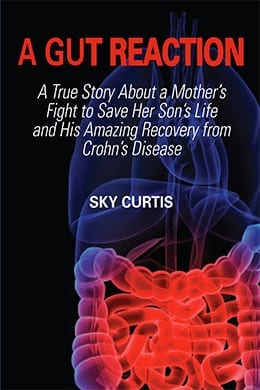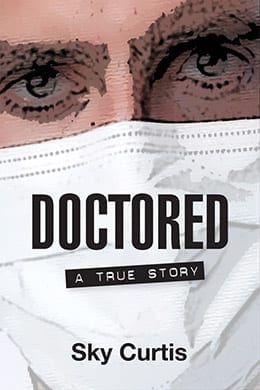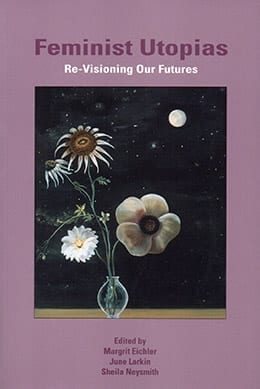Sky Curtis is a former magazine writer, educational software designer, editor, playwright, columnist and children’s writer. She now writes fiction and non-fiction books for adults. Her most recent book, Doctored, was published by Inanna Publications in 2010. Sky lives in Toronto with her family.
Foreword
by Dr. Thomas J. Borody, Director, Centre for Digestive Diseases, Sydney, Australia
Any patient with chronic ulcerative colitis or Crohn’s colitis will be able to explain to the lay person who does have the disease that they are suffering on a daily basis with chronic abdominal pain, cramping, urgency to run to the bathroom, frequent bleeding, weight loss, tiredness, multiple drug therapies with their own side effects, hospitalizations, colonoscopies, biopsies, pathology and drug costs, which become the ever-consuming life of the patient. It can take over the patient’s life leaving him/her little time for work, hobbies or pleasure. It is in this context that Chris Curtis, supported valiantly by his mother Sky, took on the battle against a condition that has no known specific cause. Not only did they take on the battle against the disease itself but also against the ‘Establishment,’ which has in its mind the understanding that colitis is somehow caused by an abnormal reaction to the flora that is normally housed in the bowel. In fact, the whole story revolves around bowel contents. This book is about bowel contents itself. How it protects us. How it can be infected. How the infection can affect the life of the person who is carrying the infected bowel flora. And how this can be corrected.
The human bowel flora contains a complex population of bacteria of several hundred different species. This is a minimum estimate. As each day passes more bacteria are identified by the new genetic methods. The colon itself is densely populated with at least 500 species and more than 30,000 sub-species with their various normal bacteria. Indeed our “poo is a zoo” as it contains many little living animals that live within our bowel. These organisms and the chemicals they produce, can affect the body in a positive or negative sense. This is called the human microbiota. It protects us from invasion by bad bacteria by having a characteristic termed in the late 1980s as being “colonization resistance.” If we did not have this resistance then the food we ingest every day, which is relatively polluted by various bacteria as well as viruses, and at times can pass through the gastric acid and the duodenal pancreatic juices—would certainly infect us on a daily basis, giving us chronic diarrhea, pain, gas, cramping and perhaps weight loss. However, we are endowed with a normal bowel flora with enormous numbers of bacteria that prevent implantation. Hence the good bacteria prevent the bowel flora from catching chronic infection. If one considers the bowel flora as a large organ of the body, it too can suffer from various disorders such as infection. Common infections we know are Salmonella, Shigella, Campylobacter and, of course, the epidemic of Clostridium difficile which is well known in North America.
What is less known is that colitis comprises a number of different types of infections that we have not yet identified. Just as one can use normal human flora implanted into the colon to clear up infection of Clostridium difficile, Sky Curtis felt that such implantation of normal flora into Chris’s bowel may help clear up his colitis infection.
The use of healthy human flora to implant into the colon would clearly be the most complete probiotic therapy available today. There is no known probiotic available today to mankind that comes close to matching the complexity of the normal human flora. It acts as a broad-spectrum antibiotic factory capable of eradicating bad bacteria and spores because in itself it produces bacteriocins or antibiotic-like agents. Indeed, few people realize that bacteria themselves are the source of many of our normal antibiotics such as Vancomycin, which originated from a bacterium found in Borneo in ’50s. Faecal bacteriotherapy or more recently Faecal Microbiota Transplantation (fmt) involves the infusion of healthy human donor faecal slurry or bacteria into the bowel of the recipient who might have the infection causing his illness. It can be dramatically curative in conditions such as recurrent Clostridium difficile infection. However, little work has been done in the area of Ulcerative colitis and Crohn’s disease. It can be affective in Irritable Bowel Syndrome—both diarrhea-predominant and constipation-predominant—and there have been some reports of patients who had short-term benefit when colitis was treated.
Sky and Chris Curtis took the disease on. They had the courage and conviction that if a normal bowel flora environment was created recurrently in Chris’s bowel then perhaps his colon—which was sentenced to be removed—might reverse its inflammation by killing off the infection with the normal incoming bacteria. Through perseverance, and many minor complications but with the vision of a normal bowel function, Sky and Chris won. This book, A Gut Reaction, describes the experience of Sky Curtis and her son Chris using faecal transplantations, under my very distant guidance from Australia, to heal the symptoms and signs of severe colitis as evidenced by absence of active inflammation on a follow-up colonoscopy.








InannaWebmaster –
“Throughout this difficult and challenging time when Sky was desperate to find a cure for her son, she was somehow able to maintain her wonderful sense of humour. This much-needed account of an increasingly common medical problem is thorough and clear while at the same time injected with a positive attitude and a gentle wit.”
—Pamela H. Tate, Craniol Sacral Therapist